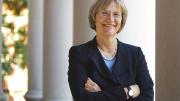As the nation’s teachers and students return to classrooms this fall, a small, well-prepared group of education leaders will be ready to shape their experiences in novel ways and boost achievement in schools and school systems from Boston to Philadelphia to Des Moines to DC. Who are these new leaders? They are our first class of graduates from Harvard’s Doctor of Education Leadership, or EdLD, program—21 extraordinarily talented women and men who will be advancing curriculum reform, directing strategy, coaching principals, and recruiting teachers in schools, districts, agencies, and non-profits throughout the country.
These graduates are uniquely trained, since their degree program was uniquely constructed. During their time at the Graduate School of Education, they discussed and debated the latest thinking in educational theory and practice with such faculty as Elizabeth City, Monica Higgins, and Jal Mehta. But they also studied politics and American public policy with Elaine Kamarck of the Kennedy School, explored child welfare and social justice with Elizabeth Bartholet and Jessica Budnitz of the Law School, and learned how to build and sustain a successful enterprise with Clayton Christensen, Chet Huber, Derek van Bever, and Stephen Kaufman of the Business School. They experienced one Harvard, its distributed strengths within their reach as they gained insights across disciplines that all come to bear on the daunting task of reforming and improving education.
I have been struck, especially in recent years, by the appetite among faculty for opportunities to solve problems that exist in the spaces between Schools and departments. Guided by questions not easily answered through single disciplines, they seize on issues such as energy or global health or urbanism. They lead efforts that reveal the foundations of human behavior, unlock the potential of neuroscience, and address new challenges posed by life in the digital age. Their explorations take them from engineering to the humanities, from medicine to public health as they advance research in collaboration with colleagues who have complementary expertise and skills.
Students, too, are eager to learn from and work with faculty outside of their programs of study. Over the past four years, cross-school registration has increased by more than 30 percent. Courses on the art of communication, design thinking, the basics of computer science, and innovation and entrepreneurship attract individuals from diverse intellectual backgrounds, creating more occasions for students to consider issues from a variety of perspectives. Concentrations in architecture and theater, dance, and performance are being developed, and will connect undergraduates with experts in the Graduate School of Design and at the A.R.T. At the same time, faculty from eight—and counting—Schools have created modules and courses for HarvardX, a growing online learning initiative that benefits students on campus and learners around the world.
If research and teaching are the heart of what we do at Harvard, the structure we have in place to support those priorities is our lifeblood. In the past few years, we have adopted a University-wide calendar, integrated information technology, and reorganized the Harvard Library. These significant changes make it easier for members of the campus community to take full advantage of all that Harvard has to offer them. We also have created common spaces, including the recently renovated Science Center Plaza, to encourage spontaneous engagement.
Being surrounded by excellence raises expectations and inspires aspirations. It is one of the greatest benefits of membership in the Harvard community. One month before the first EdLD students graduated, I joined Pusey Minister Jonathan Walton to dedicate the Porch at Memorial Church. Standing among the chairs and tables that now look out over Tercentenary Theatre, he captured beautifully the ideal of one Harvard, noting that the new common space belonged to every member of our community and that every member of the community belonged in the space. This reciprocity is, in my mind, the essence of being a part of Harvard. Celebrating all that the University is means having the courage to imagine all that it can be, all that it can do for the world when we work together and raise our sights.
Sincerely,
Drew Faust









